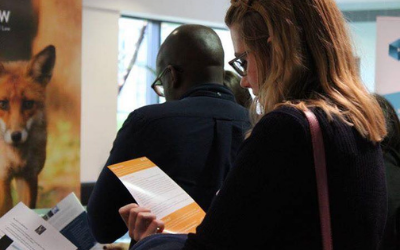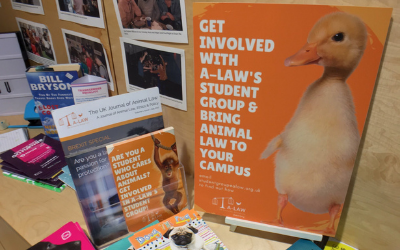Professor Joan Schaffner
Joan is an Associate Professor of Law at the George Washington University Law School. Joan directs the GW Animal Law Program which is devoted to researching and improving the lives of animals through the law.

Joan is an Associate Professor of Law at the George Washington University Law School. She received her B.S. in mechanical engineering and J.D. from the University of Southern California, and her M.S. in mechanical engineering from the Massachusetts Institute of Technology. Joan directs the GW Animal Law Program which is devoted to researching and improving the lives of animal through the law. She also coordinates the Animal Law Lawyering Project which provides students with outside placements in the animal law field. Her most recent book entitled ‘Introduction to Animals and the Law’ was published by Palgrave MacMillan in 2011 as part of their Animal Ethics Series. In August 2013 she received the ‘Excellence in the Advancement of Animal Law Award’ from the American Bar Association.
Did you always know you wanted to be an academic?
No, it took me a while to find my niche. My first love was music and in fact I began my college career as a music performance major in percussion. However, I soon realized that I needed a degree in which I could actually make a living so I changed majors to mechanical engineering because I was pretty good and math and physics. However, after getting an advanced degree and working for several years I was unfulfilled and so I went back to get a law degree. What I found was that I really enjoyed law school and realized it was both because I found the study of law very interesting but also because I was more at home in an academic setting than a commercial setting. I was fortunate enough after practicing law for one year and doing a judicial clerkship to secure am academic position teaching law at the George Washington University. That was twenty years ago and I still love it!
When did you decide you wanted to focus on Animal Law?
About ten years ago in fall 2003.
How did you get into Animal Law?
A colleague of mine and I wanted to create a pro bono project for GW Law students to both benefit the District of Columbia (DC) and provide an educational opportunity for students to impact the real world. We both love animals and we realized that the laws in DC regarding animals had not been reviewed for many years. So we created a project to study the animals and the laws in DC that affect animals and draft a report summarizing the current state of the animals and the law in DC and proposing amendments to improve them. We completed the report and drafted legislation, a version of which ultimately was enacted by the DC Council as the Animal Protection Amendment Act of 2008. Working on this project, I found my passion! The work itself was rewarding as was meeting and working with animal advocates in DC as well as those nationwide and thus I turned my attention to animal law and created the Animal Law Program at GW Law that now includes courses, seminars, events and conferences in a variety of animal law topics, the Animal Welfare Project, internship opportunities in animal law, and a very active Student Animal Legal Defense Fund chapter.
How much of your focus is Animal Law?
Although I only occasionally teach an animal law seminar as we have terrific adjunct professors in DC who spend their careers practicing animal law, the bulk of my scholarship and “extra” legal activities all focus on animal law.
What is the rest of your focus?
I teach courses in civil procedure, remedies, and a seminar in sexuality and the law focusing on how the law affects lesbian, gay, bisexual and transgender individuals. I am also the faculty advisor to Lambda Law, the GLBT student group, and the faculty advisor and editor-in-chief of the American Intellectual Property Law Association Quarterly Journal.
How is your day at work spent?
As an academic I have a lot of flexibility in the work day. During the school year I spend the day teaching, meeting with and advising individual students, researching and writing, working with the student organizations I advise, coordinating the Animal Welfare Project, and attending faculty and administrative meetings. Over the summer I focus more on my scholarship. I also am active in the American Bar Association, Tort Trial and Insurance Practice Section, Animal Law Committee.
What animal welfare work are you most proud of?
Two aspects of my animal welfare work are especially important to me: my publications and the Animal Welfare Project work with my students.
Although I have written chapters in a number of books devoted to animal law issues and have edited two animal law books for the American Bar Association, I am most proud of my book An Introduction to Animals and the Law (Palgrave MacMillan 2011).
Through our Animal Welfare Project I have worked with students on a number of important projects that ultimately have ended successfully. Two of which I am most proud are the legal comments we submitted to the US Fish and Wildlife Service (FWS) in support of a petition to list all chimpanzees as endangered, free-roaming and captive chimpanzees alike. This year the FWS agreed that the split-listing of wild and captive chimpanzees was illegal. Most recently, we submitted a comment to the National Marine Fisheries Service (NMFS) in opposition to the Georgia Aquarium’s permit request to import 18 wild-caught beluga whales from Russia to the U.S. for public display. We also worked with several NGOs on a potential lawsuit in the event NMFS issued the permit. On Aug. 5, 2013 NMFS denied the permit. This signal from the U.S. government that the U.S. will not endorse the live capture of cetaceans for public display in the U.S. was a huge victory for all marine mammals and their advocates. It was, however, a bittersweet victory, as the fate of the 18 beluga whales that had been captured for import to the U.S. remains uncertain but it is unlikely to be good.
Additionally, it has been particularly rewarding to co-sponsor with the No Kill Advocacy Center the annual No Kill Conference at GW. Since 2009, we have brought thousands of animal advocates, shelter workers, lawyers, veterinarians, government officials, and others, to learn how to create no kill communities and stop the needless killing of homeless animals in our shelters.
Do you enjoy the work?
ABSOLUTELY! In my opinion, I have the best job/career on earth. I have the flexibility to focus on issues that are important to me and feel passionately about, engage with young, bright, students, and hopefully inspire them to find the perfect career, one in which they are pursuing their passion as I am able to do every day. Of course I hope that a few of my students will find their passion in animal law and will be the next generation of lawyers working to improve the lives of animals worldwide.
Getting involved in animal law transformed my personal life as well. After learning of the institutional cruelty inflicted on so many animals, I have become a vegan. Moreover, after meeting animal advocates who are working with animals in DC and learning of the fate of so many of the animals in our shelters, I got involved on the ground with animal rescue and fostering and now live in a house full of fabulous feline companions!
How can a new lawyer steer their practice towards this area?
There are not many paying opportunities to practice animal law yet, although it is definitely a cutting edge and expanding area of legal practice. Nevertheless, there are a few opportunities in a variety of different areas where one might steer a practice. First, some attorneys might choose to set up a solo private practice and handle cases primarily for companion animal owners involving their animals. Such a practice might include defending a dog who has been declared dangerous, filing an action on behalf of an owner against a third-party who wrongfully injured or killed the owner’s animal, setting up pet trusts to establish care for the animal in the event of the owner’s death, and the like. Another pathway is to work for NGOs or private firms involved with seeking greater legal protections for animals. These groups may litigate or work on legislative/lobbying efforts to protect animals used for food, clothing, research and entertainment and/or free-roaming animals. A third pathway is to seek employment with the government, including state prosecutors offices that enforce animal cruelty laws or the Department of Justice, Natural Resources Wildlife Division that prosecute violations of federal statutes designed to protect animals, or with state or federal agencies that enforce animal laws such as the Animal Welfare Act, the Endangered Species Act, and the Marine Mammal Protection Act. A final pathway, which may be the most available at this stage in the trajectory of animal law practice, is to provide pro bono services for people or NGOs in need of an animal lawyer.
What tips would you give to students who want to practice in this area?
Capitalize on what is available at your law school to learn all that you can about animal law. Take a course that is offered, write a paper on an animal law topic either as part of a journal commitment or as an independent writing project, do an internship over the summer or during the semester in an animal law related practice, and get involved with your student animal law organization. Bring animal law speakers to your campus to educate yourself and your colleagues, attend conferences on animal law, and compete in animal law competitions. Follow blogs and web sites devoted to animal law to stay informed of the most recent cases and issues involving animals and the law. Join your local bar animal law committee or section, if open to students, the national animal law committee of the American Bar Association, Tort Trial & Insurance Practice Section and/or an international animal law organization. Volunteer with a local animal organization to help the lives of individual animals and go vegan. A committed animal law advocate should not only “talk the talk” but “walk the walk.”
Follow Us !
WE NEED YOUR SUPPORT
We rely upon membership income and donations to carry out our work. Please join us or donate and support our work.
Become a Volunteer! If you like what we’re doing…
why not find out about the different ways you can get involved in our important work?






